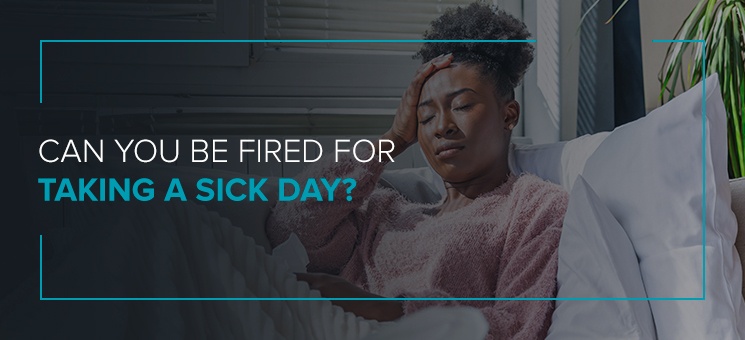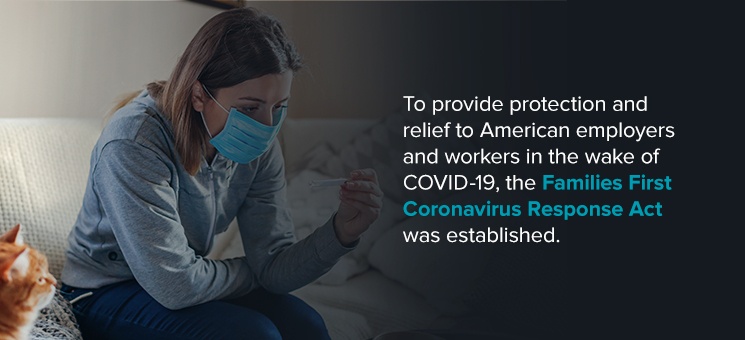By Weisberg Cummings, P.C. on December 28th, 2020
Can an employer fire you for calling in sick? The short answer is yes, your employer can fire you for taking a sick day. Pennsylvania is an at-will state, which means an employer can choose to fire an employee for any reason with no warning. However, the reason for firing the employee must not be unlawful, such as discrimination or retaliation.
Most employers have policies that cover sick leave, and if an employee does not follow the rules established by these policies, this can put them at risk of being fired due to taking a sick day. Many employers place an expectation on employees to notify them if they will not be coming in to work for the day.
Unfortunately, even if you follow all the rules according to your employer’s policies, you may still be fired for taking a sick day. There are some exceptions, however.
Employment Contracts
Though PA is an at-will state, one exception to potentially getting fired for being sick is if your contract protects you. If you are an employee working under a contract that states your employer cannot fire you for using a sick day under most conditions, then your employer likely will not be able to fire you for taking a sick day.
While this tends to be most common in union environments, some contracts for individual employment also include this stipulation.
Americans With Disabilities Act
Another exception to Pennsylvania’s at-will rule is if you have a disability. Under the Americans with Disabilities Act, you may be protected from being fired by an employer for taking a sick day due to your disability.
The ADA states that employers should make reasonable accommodations for employees with disabilities, such as work schedule adjustments, modifications to the workspace and reallocation of certain non-essential tasks and job duties that an employee with a disability cannot perform.
For an employee to get the protections offered by the ADA, including additional sick leave, they must disclose their disability to the employer. Employers should have internal processes that allow employees to formally make requests for additional sick leave and document their needs.
Families First coronavirus response act
If you have contracted COVID-19, can you get fired for calling in sick? To provide protection and relief to American employers and workers in the wake of COVID-19, the Families First Coronavirus Response Act was established. The intention of the FFCRA is to help the nation combat the effects that the virus has on the workplace. Certain private American employers can receive reimbursement through tax credits, allowing these employers to provide their employees with paid leave for reasons related to COVID-19.
The FFCRA can allow employees to stay on the payroll and ensure they are not forced to choose between adhering to public health measures and receiving a paycheck. The Wage and Hour Division of the U.S. Department of Labor administers this paid leave.
You may be eligible for FFCRA leave if you work for an employer in the private sector that has fewer than 500 employees. You may also be eligible to take FFCRA leave if you work in the public sector. Typically, the maximum amount of paid sick leave you can take under the FFCRA due to COVID-19 is two weeks. FFCRA leave is set to expire on December 31, 2020.
FMLA Leave
Under the Family and Medical Leave Act, eligible employees can take as many as 12 weeks of unpaid leave to deal with caregiving or major health demands. The intention of the FMLA is to allow employees to balance family and work responsibilities, along with accommodating the legitimate interests of employers and promoting equal opportunity for employment for men and women. Employees can use FMLA leave while:
- Recovering after surgery.
- Caring for their newborn baby.
- Getting treatment for a serious health condition or a chronic illness.
- Caring for an immediate family member who is sick, such as a spouse, parent or child.
You do not have to ask for FMLA leave specifically when you submit your request to your employer for time off. Instead, your employer should understand that you qualify for FMLA leave due to the circumstances in your request.
Not every employee is eligible for FMLA leave, however. To meet eligibility requirements, you must:
- Have worked for your employer for a minimum of 12 months.
- Be working in a location in which your company employs a minimum of 50 employees within 75 miles.
- Have worked for your employer for a minimum of 1,250 hours within the past 12 months.
You can choose to take FMLA leave in a single lump sum, or you can choose to use it to temporarily scale back on the number of hours or days you work. Your employer should keep your job available for you when you return to work or an equivalent position with the same duties, location, pay and benefits. You should also continue receiving your benefits during your leave, such as your health insurance.
Work Conditions
Finally, if you get injured or sick due to the work conditions at your job, you should also not be fired for taking a sick day. Instead, your employer may be required to give you time off and pay your medical costs after you file a workers’ compensation claim. Due to workers’ compensation protections, it may be unlawful for your employer to fire you if you are sick or injured because of your work conditions.
In some cases, it is obvious that your injury or illness occurred at work or is a result of your work conditions. However, in other instances, this can be harder to prove, and your employer may try to fire you before you are able to make a workers’ compensation claim. If this happens to you, this could be a violation of your employee rights under workers’ comp laws.
Speak to an Experienced Employment Lawyer at Weisberg Cummings, P.C.
At Weisberg Cummings, P.C., we are too often approached by clients who got fired for being sick. Our employment lawyers provide workers in Pennsylvania with legal assistance in a variety of employment matters. When you choose our firm to represent you, we will offer you personal, thoughtful service and take the time to understand your situation and goals. Additionally, you will have the opportunity to be involved in the creation of the legal strategy for your case that meets your goals.
Do you believe you may have been fired for taking a sick day? Speak to an experienced employment lawyer at Weisberg Cummings, P.C to schedule a free consultation.



